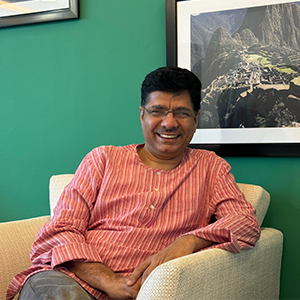
IIM Ahmedabad
Dr. Rajesh Chandwani
I am a faculty member in the Human Resource Management area at the Indian Institute of Management Ahmedabad and a Fellow of IIM Bangalore. My journey into filmmaking is deeply intertwined with my life as a medical practitioner, researcher, and teacher. My career began as a pediatrician after earning my MD from Baroda Medical College. Working across rural and urban India exposed me to the complexities of healthcare delivery and the often-invisible struggles of frontline workers. These experiences stayed with me when I transitioned into academia, where my research explores healthcare human resource management, service quality, IT-enabled delivery, and affordable care. Filmmaking emerged naturally from this trajectory, not as a departure from scholarship, but as its extension. For me, films are a medium of pedagogy, research, and advocacy. Just as I write cases or publish papers, I create films to disseminate knowledge, provoke empathy, spark reflection and inspire change. In my classrooms, films bring alive discussions on service excellence, inclusive workplaces, and human-centered care, enabling management education to move beyond textbooks. Over the years, I have made several films on social and healthcare issues. “Tum Tak” explored the government’s work with the HIV community; “We Are Not Gods” highlighted the growing violence against doctors; while “More than a Uniform” paid tribute to the courage and resilience of nurses during the 26/11 Mumbai attacks. These works have been used widely by NGOs and training agencies to sensitize doctors, nurses, and frontline workers, extending their impact far beyond academic spaces. The most recent film, “God Vulture and Human”, emerged directly from my research on organ donation and transplant coordinators. Their role is paradoxical—seen as “God” by the grateful recipients, yet as “Vultures” by grieving families. The film seeks to humanize their silent labor, blending academic insight with human stories. Screened at film festivals and used in both teaching and advocacy, the film’s recognition with the National Film Award has been a deeply humbling moment in my journey. This project exemplifies my belief that filmmaking can bridge scholarship and society. For me, filmmaking is not separate from academia—it is an integrated practice. It allows me to connect my heart and mind, research and art, analysis, and empathy. It is where my identities as doctor, researcher, teacher, and storyteller converge.

